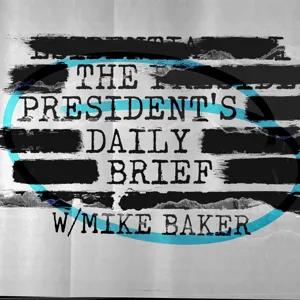Podcast Summary
Political landscape undergoing changes with elections and foreign policies: Feminist foreign policies emerge in Europe and Latin America, elections in doubt in Pakistan, Japan explores alternatives to traditional burial practices, global politics complex and evolving
The political landscape in various parts of the world is undergoing significant changes, with elections and foreign policies playing crucial roles in shaping the path towards peace. For instance, feminist foreign policies are being experimented with in Europe and Latin America, aiming to challenge the status quo of war and peace being a male-dominated sphere. Elsewhere, elections are on the horizon, with some countries aiming to root out foreign influences, while others face uncertainty due to political crises. In Pakistan, the arrest and apparent attempts to dismantle Imran Khan's party have cast doubt on the upcoming elections. Japan, on the other hand, is exploring creative alternatives to traditional burial practices due to space constraints. Overall, these developments underscore the complex and evolving nature of global politics, with various factors coming into play to shape the future of nations and international relations.
Pakistan's military interference in politics leads to instability and short-termism: The military's involvement in Pakistani politics has resulted in frequent prime minister changes, instability, and economic consequences. Imran Khan's popularity is due to his opposition to this influence.
The Pakistani military's interference in politics, which stems from deep-rooted insecurities and a desire to defend the state, has led to a dangerous cycle of instability and short-termism in Pakistani politics. This has been particularly evident in the recent ejection of Imran Khan, who gained popularity through his opposition to the army. The military's overreach has had serious economic consequences, as no Pakistani prime minister has been able to serve a full term due to this perpetual instability. The comparison between Pakistan and India, where civilian rule is more stable, highlights the devastating impact of the military's involvement in Pakistani politics. Imran Khan's popularity, despite his questionable record as prime minister, is largely due to his stance against the army's influence. The current situation is unprecedented and dangerous, and it remains to be seen how it will unfold.
Pakistan's Instability and Poland's Russian Influence Protests: Poland faces protests over efforts to purge Russian influence while Pakistan's instability and corruption charges threaten peace, with upcoming elections adding uncertainty.
Pakistan, once economically competitive with India, is now seen as a global problem due to its instability, poverty, and nuclear arms. Imran Khan, a popular and charismatic politician, faces numerous corruption charges and is unlikely to contest upcoming elections, leading to uncertainty and potential unrest. Meanwhile, in Poland, the ruling party's efforts to root out Russian influence have sparked massive protests and raised concerns from the European Union. The upcoming 2024 elections in various countries, including those in Europe and Latin America, may see peace as a key issue, as some nations experiment with feminist foreign policy and challenge traditional power dynamics. Poland, a strong ally of Ukraine, has welcomed millions of refugees and advocated for the export of German-built Leopard tanks. The proposed law aimed at purging Poland of Russian influence has faced opposition from the EU and sparked massive protests, raising concerns about its potential far-reaching effects.
New Polish law raises concerns over transparency and potential political manipulation: The new Polish law establishes a commission with vast powers to investigate Russian influence, but critics argue it could be used to target political opponents and lacks transparency, fueling suspicions of a pre-election ploy
Poland's new law aimed at investigating Russian influence in the country raises concerns about transparency and potential political manipulation. The commission established by the law, which is dominated by the ruling party, has vast powers, including access to secret documents, immunity for its members, and the ability to overturn administrative decisions and ban individuals from public office for up to 10 years. Critics argue that this setup could be used to target political opponents, especially as Poland approaches national elections in the fall. Additionally, the vague definition of Russian influence and the lack of independence for the commission fuel suspicions that the law is a pre-election ploy. Previous statements from the ruling party's leader, Yaroslav Kaczynski, further fuel these concerns, as he has publicly labeled opposition politicians as traitors and stooges. An opinion poll found that 61% of respondents believe the law is a pre-election tactic, and voters will ultimately decide the ruling party's fate in the upcoming elections. However, the potential for interference from the commission adds an additional layer of uncertainty to the political landscape.
Poland's Upcoming Election: Complex Political Landscape Amidst Russian Influence Allegations: Poland's election landscape is complicated by long-standing conspiracy theories, control of state institutions, and a new commission with Stalinist overtones, potentially stifling democracy rather than promoting it.
The political situation in Poland leading up to the upcoming election is complex and contentious, with the ruling party implementing laws and actions that some see as an attempt to purge Russian influence but others view as a threat to Polish democracy. The death of Poland's president in a plane crash over a decade ago has led to long-standing conspiracy theories and accusations of Russian involvement and cover-ups, which have now resulted in the creation of a new commission. The upcoming election is expected to be particularly close and highly contested, with the playing field already uneven due to the ruling party's control of state broadcasting and courts. Despite this, Poland has seen strong economic growth and a surge in national pride due to its stance towards neighboring Ukraine. The opposition, however, is fragmented, leaving Poland in a difficult position. The new commission, intended to address Russian influence, has distinctly Stalinist overtones and there are concerns it could stifle democracy rather than help it prosper.
Japanese funeral practices evolve with societal changes: Japanese funeral practices are shifting towards more affordable and natural methods, including balloon funerals, tree burials, and scattering ashes, due to societal changes and financial constraints.
In Japan, traditional funeral practices are evolving due to societal changes, financial constraints, and a growing preference for becoming one with nature. The use of alternative methods like balloon funerals, tree burials, and scattering ashes in the sea or mountains is increasing. These methods are more affordable and require less space compared to traditional grave sites. Traditional Japanese funerals, which are lengthy and costly, are shrinking in size and duration due to demographic changes and a preference for simpler ceremonies. This shift in culture is significant as it moves away from the traditional practices that have been in place for centuries.
Japanese death planning and personalized funerals: The concept of shukatsu in Japan encourages open conversations and personalized funeral arrangements, allowing individuals to express their unique desires for their final farewells.
The way we approach death and funerals is evolving, with more open conversations and personalized options becoming the norm. This shift is reflected in the concept of shukatsu, a Japanese term for death planning that includes funeral arrangements and requests before one passes. For instance, the Sakashita family chose a balloon funeral based on the late husband's desire to fly in the sky. As more people discuss and plan their funerals, it's leading to less taboo around death and a more personalized approach to the end of life. Additionally, the upcoming 2024 elections in various countries may bring peace to the ballot, as some regions are experimenting with feminist foreign policy, aiming to challenge the traditional male-dominated ways of waging war and making peace.





